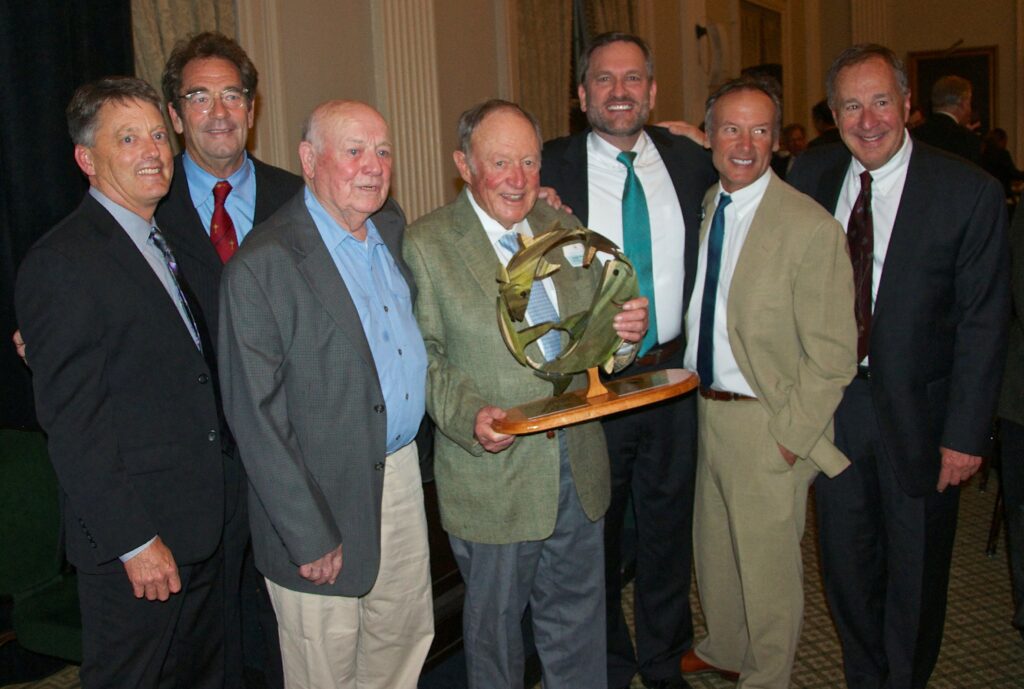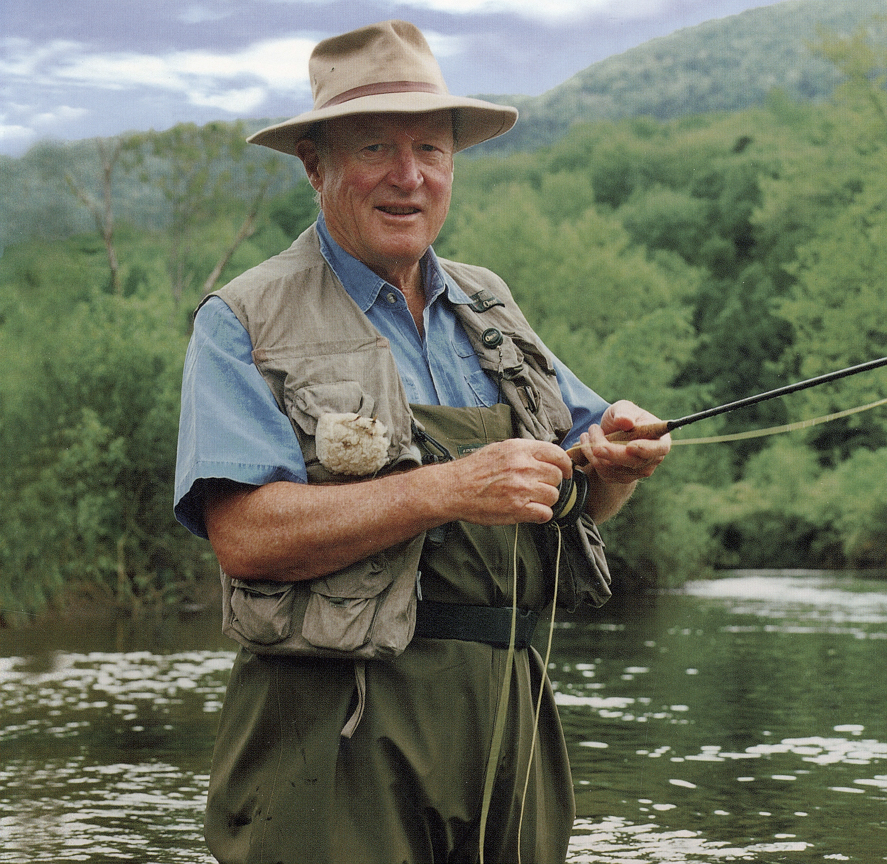Leigh H. Perkins. Photo courtesy of Orvis.
Leigh H. Perkins, a long-time friend of Bonefish & Tarpon Trust and the 2016 recipient of BTT’s Lefty Kreh Award for Lifetime Achievement in Conservation, passed away at the age of 93 on May 7, 2021, in Monticello, Florida.
Perkins purchased The Orvis Company in 1965 and over the next three decades transformed it into one of the country’s most respected sporting, apparel, and dog brands. Although he built his reputation as a shrewd businessman and marketer, Perkins was most at home wading in a trout stream or walking behind a bird dog in the field. He was a lifelong outdoorsman who hunted or fished more than 250 days a year into his 90s, and his reverence for nature was at the heart of his drive to conserve land and water resources for future generations.
Perkins’ fervent belief that anglers and hunters must work to protect those resources that make time in the outdoors so fulfilling became a company ethos and business imperative. In the 1980s, he helped pioneer corporate conservation efforts by donating 5 percent of pre-tax profits to conserving fish and wildlife through organizations including Trout Unlimited, the Ruffed Grouse Society, the Nature Conservancy, and the Atlantic Salmon Federation. In 1985, Perkins founded the Orvis-Perkins Foundation, which has donated millions of dollars to habitat and wildlife conservation efforts over the years.
Under Perkins’ leadership, Orvis became one of Bonefish & Tarpon Trust’s earliest and most generous corporate partners, supporting BTT with both charitable contributions and product donations of gear and custom apparel for use in building the organization’s membership base. With Perkins at the helm, Orvis also took a leading role in advocating for and supporting Everglades restoration, work that Orvis continues to this day.
BTT awarded Perkins The Lefty Kreh Award for Lifetime Achievement in Conservation at its annual NYC Dinner and Awards ceremony in 2016. This is the organization’s highest honor and recognized his lasting contributions to the conservation of the flats fishery.
“In many ways, Leigh Perkins helped draw the map of conserved lands and waters that we all enjoy today,” said BTT President & CEO Jim McDuffie. “Through his personal actions and his inspiring example, Leigh had a profound impact on the world we fish and hunt. And we certainly count BTT as part of his wonderful legacy. From our earliest days, Leigh and Orvis were with us, helping to shape the thriving, successful we see today.”

Born in Cleveland in 1927, Perkins was raised by a mother, Katharine Perkins, who was a dedicated angler and hunter at a time when there were few women who engaged in the outdoors. It was she who fostered his passion for nature and the sporting pursuits, and these experiences shaped his desire to conserve woods and waters so that others could enjoy them. “She taught me to fish and hunt, and she was my principal sporting companion for the first 18 years of my life,” he wrote in his 1999 autobiography, A Sportsman’s Life: How I Built Orvis by Mixing Business and Sport. Together, they caught bluegills from farm ponds, cast to cutthroats in Montana, traveled to the Atlantic salmon rivers of the Gaspe Peninsula, and shot grouse, quail, and ducks.
Although he was born into a wealthy Midwestern family, Perkins chose to make his own way in the world after graduating from Williams College in 1950. He started as a rodman on a survey crew in the iron mines of northern Minnesota, working his way up to foreman before taking a job as a salesman for Cleveland’s Harris Calorific, which made gas welding and cutting equipment. It was during this time that he discovered the value of listening to the needs of customers, which would serve him well as he built Orvis. As Perkins once told his grandson, Simon, “You always learn more by listening than by talking.” Perkins often spent time taking phone calls and reading customer letters to ensure that he was serving their needs, a practice that continues at Orvis today.
The idea of mixing business and his sporting passions first occurred to Perkins when he began looking for a company of his own to build. He had been a customer of the Vermont-based Orvis since his college days in western Massachusetts. After a nine-month courtship with then owner Dudley “Duckie” Corkran, Perkinsclosed the deal on the first day of 1965. He was a hands-on owner, serving as president, merchandiser, art director, product-developer, and whatever else needed doing. His attention to detail was legendary, and he personally approved every item in the catalog.
Over the next 27 years, Perkins would grow the company—founded in 1856 by Charles F. Orvis—from a niche business with 20 employees and $500,000 in annual sales to a mail-order and retail powerhouse with more than 700 employees and sales topping $90 million. Along the way, he was a pioneer in both business and product development. Among the first to capitalize on changes in the direct-marketing world, Perkins made the Orvis catalog a household fixture from coast to coast and opened Orvis retail stores in cities around the country.
Perkins prioritized products that solved problems and enhanced a person’s time on the water or in the field. He introduced the first retractable zinger to hold fly-fishing tools and the first Gore-Tex rainwear. Orvis graphite fly rods were not the first on the market, but they were better-designed and more durable than competitors’. In 1966, Perkinslaunched the world’s first fly-fishing school in Manchester, Vermont, teaching 150 students the basics. He added a wingshooting school several years later.
Humble with a self-effacing sense of humor, Perkins once responded to an interviewer who asked what he’d like to be remembered for by saying, “my duck soup recipe.” However, for his dedication and impact on the outdoor world, Perkins received many accolades, including the 1992 Chevron Conservation Award. Nine years later, the University of Minnesota awarded Leigh an honorary Doctor of Laws degree, for “[helping] some of the most prominent and important conservation organizations in the world to modernize their practices, create scientific research programs and achieve their potential for service,” as well as for creating a permanent forest-wildlife research program at the university.




